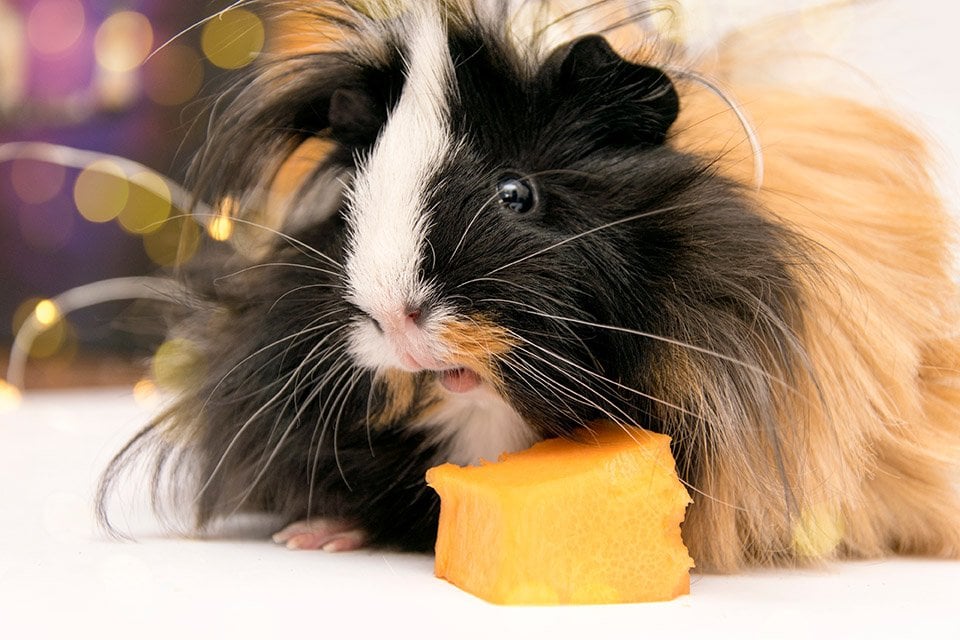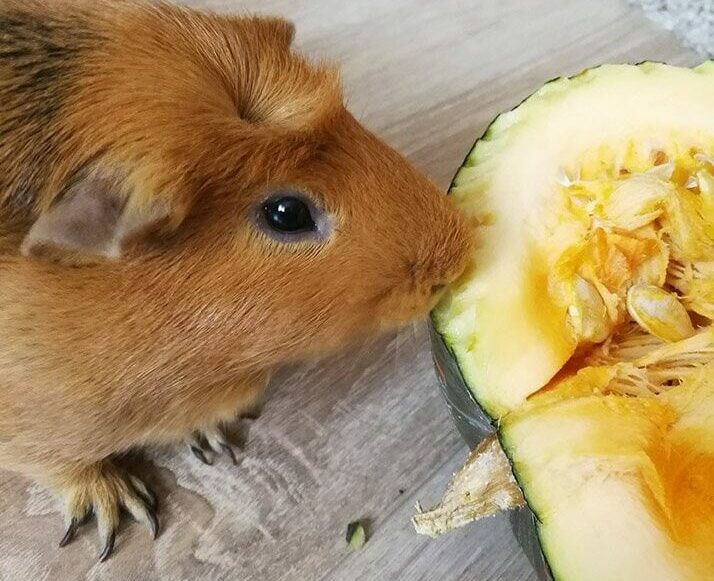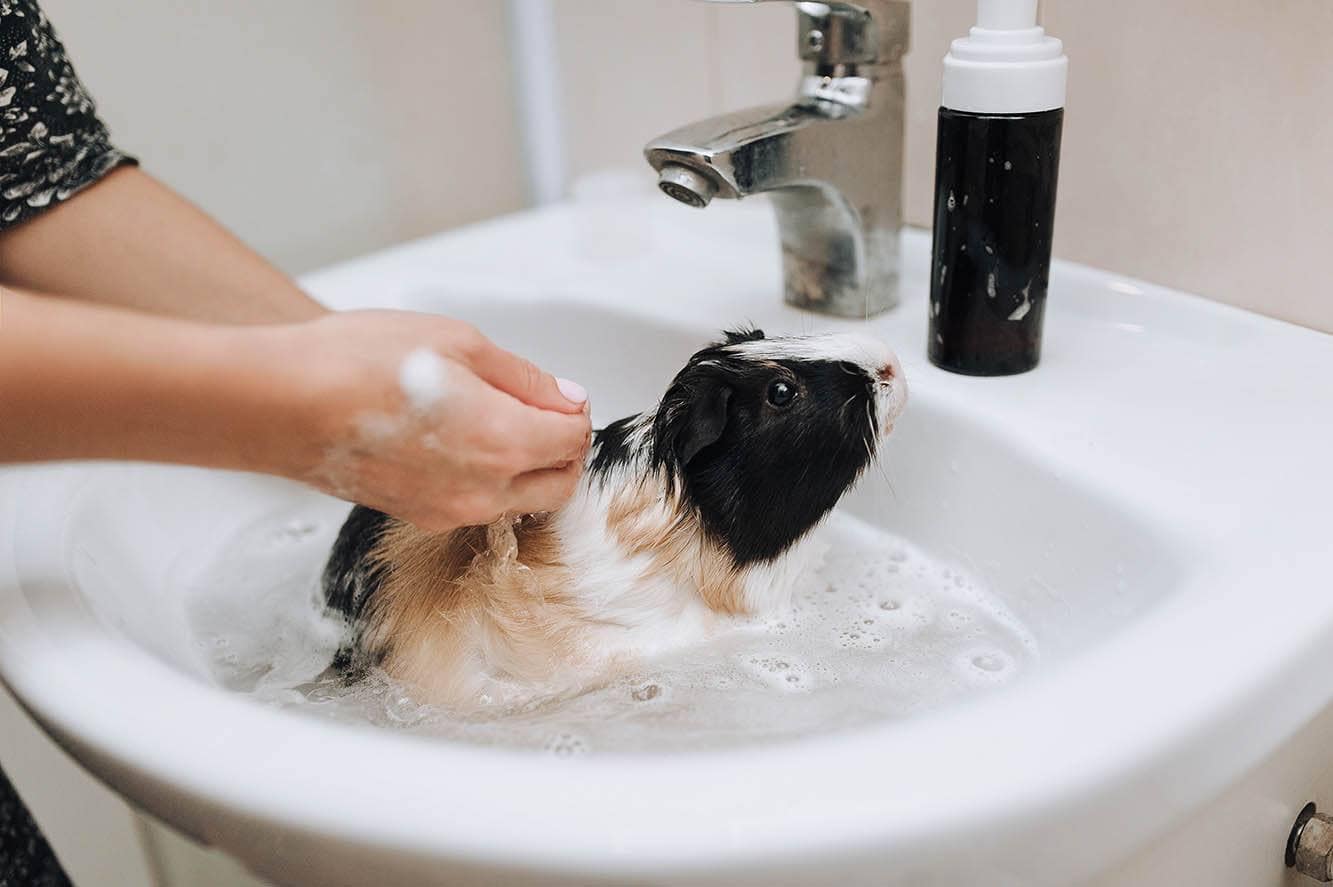
Fat, lumpy, and divine in pie, pumpkins are a delicious and nutritious seasonal treat. People love decorating them, and the iconic, bright orange pumpkin has become synonymous with fall in the United States. But can you share your favorite autumn gourd with your resident guinea pigs? Yes, guinea pigs can eat pumpkin. It is non-toxic, edible, and totally safe in moderation.
In this article, we will give you an in-depth look at some nutrition facts about pumpkins, the health benefits and concerns for guinea pigs, and give you some tips for feeding these funny looking gourds to your piggers.

Pumpkin Nutrition and Fun Facts
Pumpkins are a type of gourd. Their Latin name is Cucurbita, and the plant is an herbaceous vine that flowers and grows pumpkins from the bud. Oddly, pumpkins can actually be termed fruits because of this and their seeds!
They are interchangeably called gourds, squash, and pumpkin depending on the region and type and shape.
Based on 100 g of raw pumpkin, these nutrients from the USDA are of particular note for guinea pigs:
Health Benefits of Pumpkin for Guinea Pigs
Pumpkin is an excellent supplementary food for your guinea pig’s diverse and well-balanced diet! In moderation, this festive gourd can confer a host of health benefits.
Beta Carotene and Vitamin A
Pumpkin is incredibly high in beta carotene, which is the precursor to vitamin A. Each 100 g of raw pumpkin is packed with 5.7 g of vitamin A.
Beta carotene is particularly helpful for preventing cataracts and promoting eye health, supporting the mucus membranes of the body, and keeping skin hydrated. It is also the nutrient that gives pumpkins their bright orange coloration.

Vitamin C
While pumpkin is not a significant source of vitamin C, it can be included as part of a more diverse diet to make sure your guinea pig gets their full daily recommended value.
Vitamin C is so important to guinea pigs because their bodies cannot produce it themselves. The only mammals in the world that are unable to synthesize vitamin C are humans, other primates, and guinea pigs!
This essential nutrient can boost your furry friend’s immune system, support collagen levels and wound healing, and even lower the risk of heart disease and cancer.
A lack of vitamin C in your guinea pig’s diet can lead to all kinds of things like poor skin health, paralysis, and diseases like scurvy. We highly recommend checking in with your vet at every visit to make sure your guinea pig is getting enough vitamin C in their diet.
Fiber
Another benefit of pumpkin is its high fiber content. Fiber is magical for its ability to make foods easier for your intestines to absorb and pass as waste and can address all kinds of digestive issues from constipation to diarrhea.
Small amounts of pumpkin as part of a balanced diet can help keep your guinea pig’s digestive system working smoothly!
Potassium
The final nutrient in pumpkin that we’ll sing the praises of is potassium. This essential mineral allows a guinea pig’s body to do all kinds of great things including regulating fluids, nerve signals, and muscle contractions.
Potassium also protects against osteoporosis, reduces blood pressure, and prevents bladder stones. Guinea pigs are particularly prone to bladder stones, which is the crystallization of calcium that causes excruciating pain.
But by avoiding excess calcium and adding potassium-rich foods like pumpkin to their diet, you and your piggies can kiss nasty bladder stones goodbye!

Can Pumpkin Be Bad for Guinea Pigs?
Just as there are plenty of health benefits, there are also a few key reasons to moderate the amount of pumpkin you let your guinea pig eat.
Seeds
The seeds of all the varieties of pumpkins are totally edible and non-toxic. In theory, they should be safe, but when you consider the size of most seeds in comparison to your little friend, it is a totally different story.
Due to their size, pumpkin seeds pose the risk of getting caught in a guinea pig’s teeth (painful) or throat (extremely dangerous). Seeds also have incredibly high fat content, which is not entirely safe in such large volumes. A guinea pig eating a seed or two would be akin to you eating an entire jar of nut butter!
All in all, it’s just safer to remove the seeds of any pumpkin before letting your guinea pig go to town.
High Water Content
Though high in fiber, pumpkin flesh also contains lots of water. Proving that literally anything in excess really can be bad, veggies high in water content can sometimes give guinea pigs diarrhea.
To lessen the chances of digestive upset, always introduce new veggies and fruits to your piggy gradually and one at a time. That way if you notice their stool becoming watery or loose, you can simply reduce the new food and see if it helps.
High Sugar
You should also be aware that the flesh of pumpkins is relatively high in sugar. Much like in humans, a guinea pig that gets too much sugar in their diet can suffer from tooth decay issues, constipation, and obesity.
Pumpkins are not as sugary as some veggies and fruits, but with so many health concerns tied to sugar consumption, it is best to be cautious.

How to Feed Pumpkin to Your Guinea Pigs
Always feed fruits and veggies to your piggy totally raw!
Fall means that we get inundated with all kinds of delicious pumpkin-flavored things – from pies to candies, to coffee – but your guinea pig’s digestive system cannot handle flavorings, seasonings, or cooked foods at all. This means you’ll have to keep all the pumpkin spice lattes to yourself!
Flesh and Rind
Your guinea pig can eat both the fleshy inside of a pumpkin and its tough outer rind. If you feed pumpkin to your buddy with the skin on, just remember to wash it in clean water to remove any dirt or germs it may have collected.
Leaves, Vines, and Stems
You may be delighted to know that guinea pigs can even eat the leaves of the pumpkin plant – especially if you grow your pumpkins yourself! Nothing goes to waste with these hungry little herbivores.
Please note, however, that the vines and leaves of pumpkins can cause issues if eaten regularly or in excess. The green plant parts of a pumpkin are super high in calcium, which can cause excruciating bladder stones in your piggy.
Feeds leaves and vines of the pumpkin plant to your guinea pig infrequently and in extreme moderation – one leaf is more than enough!
How Much Pumpkin Should I Feed My Guinea Pigs?
Introduce any new food to your guinea pig slowly and carefully so that you can remove it if any adverse reactions show up.
We recommend starting out with just a few small cubes of pumpkin. If it does alright by them you can treat them with this bright orange squash semi-regularly, with a few days in between at least to prevent bloating and gas.
As part of a more diverse diet, you can mix a little pumpkin into their veggies no more than a few times a week.
Types of Pumpkin to Feed Your Guinea Pigs
Even though the name “pumpkin” will often recall the one iconic orange fruit, it is a name that refers to a number of very different looking squashes!
All squash that falls under the gourd species Cucurbita is safe for your guinea pig to eat. Here’s a list of some common squash you can try letting your piggies eat:

Final Thoughts on Feeding Pumpkin to Your Guinea Pig
Pumpkin is non-toxic and safe for your guinea pig to eat.
However, as ancient Greek philosophers and moms have been saying for ages: moderation is the key to health! It is inadvisable to give your guinea pig carte blanche on pumpkins. But in small amounts, these nutritious gourds can support a healthy diet and a happy piggy.
Happy munching!







